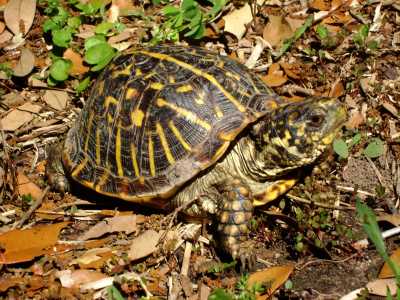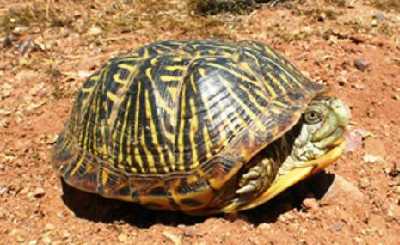 SKC Films Library |
| SKC Films Library >> Science >> Zoology >> Reptiles and Amphibians >> Order Chelonia |
| Ornate Box Turtle Terrapene ornata
Description This turtle's shell has a fancy look to it. Each shell segment (scute) has a radiating pattern of yellow lines on a dark brown background. Males have bright red or orange eyes. This color is usually repeated on the front legs, face and neck. In females, the color in these areas resemble the yellow of the stripes on the shell. Females are slightly larger than males, and the male's lower shell (plastron) is usually slightly concave. Distribution and Habitat This turtle is found from South Dakota to southern Arizona and the Rio Grande valley, with the Mississippi River marking the easternmost part of its range. It lives in prairies and pastures. Habits and Behaviors The ornate box turtle is active from April through October. It may spend its entire life within an area of only a few acres. The "hinge" in the box turtle's pastron allows it to withdraw its legs, tail, head and neck within its shell for protection from predators.
Diet Insects, spiders and worms make up most of the ornate box turtle's diet. In cow pastures, box turtles may be found around dung piles looking for beetles. They will also eat some vegetable matter, with a special preference for berries. Reproduction Eggs are laid in early summer. The nest is a hole dug into the ground by the female, into which she lays 2 to 8 white eggs. Once laid the eggs are not guarded or incubated by the female. They hatch in about two months. Some females will lay a second clutch later in the year. Hibernation In autumn the box turtle will dig itself into the earth and prepare to shut down until spring. It may only get a few inches below the ground surface, but that is usually enough to get it through the winter. Other Information The ornate box turtle is the official state reptile of Kansas. Scientific Classification phylum Chordata |
| SKC Films Library >> Science >> Zoology >> Reptiles and
Amphibians >> Order Chelonia This page was last updated on May 04, 2018. |

